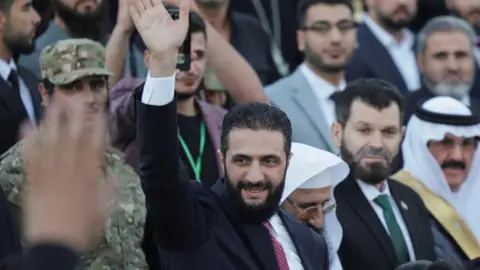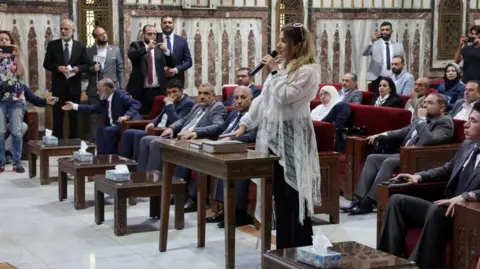Syria holds first elections since Assad, but not in all provinces
4 hours agoDavid Gritten

 Reuters
ReutersSyria will hold its first parliamentary elections on Sunday since the fall of Bashar al-Assad, amid concerns over inclusivity and successive delays.
There will be no direct vote for the People’s Assembly, which will be responsible for legislation during a transitional period.
Instead, “electoral colleges” will select representatives for two-thirds of the 210 seats. Interim President Ahmed al-Sharaa will appoint the rest.
Long-time former President Assad was ousted by Sharaa’s forces 10 months ago after a 13-year civil war.
Authorities say they have postponed the polls for security reasons in two Kurdish- controlled provinces and a third which saw deadly fighting between government forces and Druze militias.
The clashes, in July, marked the latest outbreak of sectarian violence in Syria since Assad’s overthrow.
In a speech at the UN General Assembly last week – the first by a Syrian president in 60 years – Sharaa promised to bring to justice everyone responsible for the bloodshed, as well as those who committed atrocities under Assad.
He also pledged that Syria was now “rebuilding itself through establishing a new state, building institutions and laws that guarantee the rights of all without exception”.
Sunday’s polls are being overseen by the Higher Committee for the Syrian People’s Assembly Elections, whose 11 members were chosen by the president in June.
The number of seats allocated in each of 60 districts is based on census data collected in 2010 – the year before the country descended into a civil war that killed more than 600,000 people and displaced another 12 million.
The postponement of the elections in the three provinces – Raqqa, Hassakeh and Suweida – means the electoral colleges in only 50 out of 60 districts will be choosing representatives for about 120 seats on Sunday.
There will be more than 1,500 candidates, who must also be electoral college members. Supporters of “the former regime or terrorist organisations” were barred from membership, as were advocates of “secession, division or seeking foreign intervention”.
At least 20% of the electoral college members were required to be women. But there were no minimum quotas for female lawmakers, nor for those from the country’s many ethnic and religious minorities.
The president will choose representatives for 70 seats from outside the electoral colleges.
Last month, 14 Syrian civil society groups expressed concern that this meant he would have direct influence over parliament’s composition.
“This setup makes the parliament susceptible to power balances not reflecting the voters’ will and undermines its intended representative nature, enabling the executive authority to dominate an institution that should be independent and reflective of the popular will,” a joint statement warned.
They also said the president’s direct and indirect influence over the Higher Committee and the electoral colleges rendered the elections “symbolic at best, devoid of their democratic purpose of ensuring representation and accountability”.

 Reuters
ReutersSharaa has defended the way the elections are being held. “As a transitional period, there is a difficulty to hold popular elections due to the loss of documents, and half of the population is outside of Syria, also without documents,” he said in a television interview, referring to the millions of refugees who have not returned.
The Higher Committee said it was not possible to hold elections in Raqqa, Hassakeh and Suweida because of the “security and political situation”. The 20 seats allocated to them will remain vacant until polls can take place.
Raqqa and Hassakeh are mostly controlled by a Kurdish-led militia alliance, the Syrian Democratic Forces (SDF), which is in a stand-off with the interim government over the implementation of a March agreement to integrate all military and civilian institutions into the state.
Thouraya Mustafa of the Kurdish Democratic Union Party (PYD) said the electoral process and delay showed the government had the same mentality “as the previous authoritarian mentality”.
“We see exclusion and denial of the rights of the Syrian people, such as elections. Therefore, the Syrian interim government does not represent the will of the Syrian people,” she told Reuters news agency.
The government also holds little sway in Suweida, where tensions with the predominantly Druze population have remained high since the sectarian violence there three months ago.
The violence erupted when Druze militias clashed with Sunni Bedouin tribes, which prompted the government to send its forces to intervene. More than 1,000 people were killed in the fighting, most of them Druze, according to monitoring groups.
Hussam Nasreddin, a resident of the predominantly Druze southern Damascus suburb of Jaramana, dismissed the electoral process as “more like an appointment”.
“The People’s Assembly should be elected by the people and it should represent the people,” he told Reuters. “Today we don’t know anything. We did not see any lists or representatives. We didn’t see anything.”